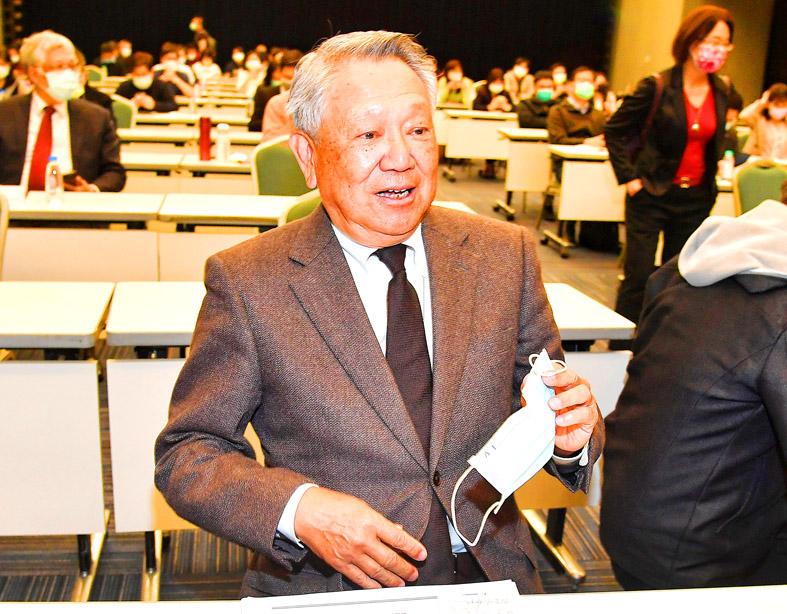Adimmune Corp (國光生技) has an upbeat outlook for its flu vaccine business next year, chairman Steve Chan (詹啟賢) told a media briefing in Taipei yesterday.
The company expects to obtain marketing approval from the Chinese regulator for its quadrivalent flu vaccine in the first quarter of next year, with more approvals likely from regulators in Jordan and Pakistan later in the year, Chan said.
An application for market approval typically takes 12 to 18 months in those countries, Adimmune said.

Photo: CNA
Chan said he expects the company to receive orders for 5 million doses from China, which is a large market for flu vaccines.
Adimmune aims to expand in Russia by supplying more of the substance used in its quadrivalent flu vaccine to local biopharmaceutical company NPO Petrovax Pharm LLC, Chan said.
Adimmune is also preparing an application for market approval in Mexico, which would be its first market in South America, he said.
While the WHO recommends a different composition for influenza vaccines used in the northern hemisphere than for those used in the southern hemisphere, Adimmune, whose vaccines are currently only used in the north, is confident that it could produce vaccines for the south, as it would only involve adjusting the strain, Chan said.
Chan also told reporters that the company has begun recruiting participants in Indonesia for phase 2 clinical trials of a COVID-19 vaccine candidate.
Participants would receive a first vaccine dose next month and an interim analysis could be conducted in June next year, Chan added.
If the phase 2 human trials proceed smoothly, the company would apply to conduct phase three clinical trials in Indonesia, which would involve recruiting 30,000 participants and might cost NT$2 billion (US$71.84 million), Chan said.
Some conglomerates in Southeast Asia have shown interest in investing in the project, he added.
Adimmune said it would not seek emergency use authorization for the vaccine, but would instead apply for marketing approval.

WEAKER ACTIVITY: The sharpest deterioration was seen in the electronics and optical components sector, with the production index falling 13.2 points to 44.5 Taiwan’s manufacturing sector last month contracted for a second consecutive month, with the purchasing managers’ index (PMI) slipping to 48, reflecting ongoing caution over trade uncertainties, the Chung-Hua Institution for Economic Research (CIER, 中華經濟研究院) said yesterday. The decline reflects growing caution among companies amid uncertainty surrounding US tariffs, semiconductor duties and automotive import levies, and it is also likely linked to fading front-loading activity, CIER president Lien Hsien-ming (連賢明) said. “Some clients have started shifting orders to Southeast Asian countries where tariff regimes are already clear,” Lien told a news conference. Firms across the supply chain are also lowering stock levels to mitigate

IN THE AIR: While most companies said they were committed to North American operations, some added that production and costs would depend on the outcome of a US trade probe Leading local contract electronics makers Wistron Corp (緯創), Quanta Computer Inc (廣達), Inventec Corp (英業達) and Compal Electronics Inc (仁寶) are to maintain their North American expansion plans, despite Washington’s 20 percent tariff on Taiwanese goods. Wistron said it has long maintained a presence in the US, while distributing production across Taiwan, North America, Southeast Asia and Europe. The company is in talks with customers to align capacity with their site preferences, a company official told the Taipei Times by telephone on Friday. The company is still in talks with clients over who would bear the tariff costs, with the outcome pending further

Six Taiwanese companies, including contract chipmaker Taiwan Semiconductor Manufacturing Co (TSMC, 台積電), made the 2025 Fortune Global 500 list of the world’s largest firms by revenue. In a report published by New York-based Fortune magazine on Tuesday, Hon Hai Precision Industry Co (鴻海精密), also known as Foxconn Technology Group (富士康科技集團), ranked highest among Taiwanese firms, placing 28th with revenue of US$213.69 billion. Up 60 spots from last year, TSMC rose to No. 126 with US$90.16 billion in revenue, followed by Quanta Computer Inc (廣達) at 348th, Pegatron Corp (和碩) at 461st, CPC Corp, Taiwan (台灣中油) at 494th and Wistron Corp (緯創) at

NEGOTIATIONS: Semiconductors play an outsized role in Taiwan’s industrial and economic development and are a major driver of the Taiwan-US trade imbalance With US President Donald Trump threatening to impose tariffs on semiconductors, Taiwan is expected to face a significant challenge, as information and communications technology (ICT) products account for more than 70 percent of its exports to the US, Chung-Hua Institution for Economic Research (CIER, 中華經濟研究院) president Lien Hsien-ming (連賢明) said on Friday. Compared with other countries, semiconductors play a disproportionately large role in Taiwan’s industrial and economic development, Lien said. As the sixth-largest contributor to the US trade deficit, Taiwan recorded a US$73.9 billion trade surplus with the US last year — up from US$47.8 billion in 2023 — driven by strong